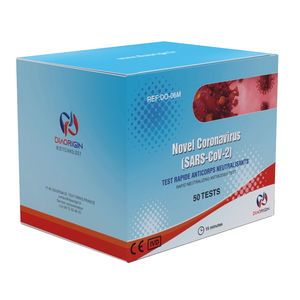
- Laboratory
- Laboratory medicine
- COVID-19 rapid test
- Diaorigin Biotechnology
COVID-19 rapid test for antibodiesimmunoglobulinSARS-COV-2

Add to favorites
Compare this product
Characteristics
- Applications
- COVID-19
- Tested parameter
- for antibodies, immunoglobulin
- Micro-organism
- SARS-COV-2
- Sample type
- blood, clinical
- Analysis mode
- immunochromatographic, fluorescence
- Format
- strip
- Other characteristics
- with digital reader
- Result display time
15 min
- Sample volume
0.01 ml
(0.00034 US fl oz)- Specificity
100 %
- Sensitivity
99.2 %
Description
Currently, vaccination against Covid-19 is at the center of the arsenal, with the objective of achieving herd immunity. Clinical studies of immunity against Covid-19 after infection or vaccination show very diverse results. Some studies show that the antibodies persist 6-8 months after infection or vaccination, while others indicate on the contrary that they drop significantly from 3-4 months. Nevertheless, the majority of studies tend to indicate that the duration of immunity is correlated with the severity of the disease, age, sex, the fact of having been vaccinated or infected, and parameters that have not yet been listed. Faced with so many diverse factors regarding the duration of immunity, it seems wise to change the prism and opt for a case-by-case approach.
According to the recommendation published on August 03, 2021 by French Ministry of Health, if the complete vaccination has not developed an anti-Spike antibody titer of 260 BAU/ml, the patients are considered as immunosuppression and not protected by vaccination. If the anti-Spike antibody titer is less than 30 BAU/ml, the patient is considered as non-responder. These levels were determined by a clinical study from the Toulouse University Hospital, which indicated that an anti-Spike antibody level of 260 BAU/ml can provide 80% protection against Covid-19.
This anti-Spike antibody test aims to distinguish the population that no longer has sufficient immunity, and to inform these individuals so that they adopt reinforced means to protect themselves, and possibly by anticipating revaccination, which will limit contamination and hospitalizations.
VIDEO
Related Searches
- Blood rapid diagnostic test
- Rapid lateral flow test
- Immunoassay rapid diagnostic test
- Cassette rapid diagnostic test
- Rapid virus test
- Rapid respiratory infection test
- COVID-19 rapid diagnostic test
- Strip rapid diagnostic test
- Clinical rapid diagnostic test
- Rapid test with digital reader
- Fluorescence rapid diagnostic test
- Neutralizing antibody rapid test
*Prices are pre-tax. They exclude delivery charges and customs duties and do not include additional charges for installation or activation options. Prices are indicative only and may vary by country, with changes to the cost of raw materials and exchange rates.


